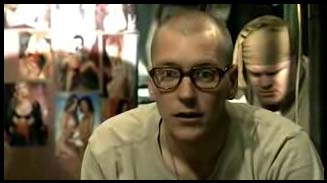JIHADIST PROPAGANDA VIDEO APPROPRIATED CLIPS TOWARD AN ALTERNATE NARRATIVE
There is a lot of misinformation going around the web right now regarding a trial that began Wednesday in Germany for the man who attacked American soldiers at the Frankfurt International Airport in March of this year, killing two and injuring two others. Several reports are citing other sloppy reports that claim that the Frankfurt shooter, Arid Uka, told a court in Germany yesterday that he was motivated to kill American soldiers heading to Afghanistan after he watched the movie Redacted. However, this is not what Uka said at all. What he said was that prior to the attack, he had been influenced by radical Islamic propaganda online. According to Stars And Stripes, Uka told the court that the night before the crime, he followed a link to a video posted on Facebook that purported to show American soldiers raping a teenage Muslim girl. According to a New York Times report from last March, Uka believed the video took place in Afghanistan. The video he viewed carried the title, “U.S. soldiers raping our sisters, wake up oh Ummah!” The video appropriated clips from Brian De Palma’s Redacted, sometimes with extraneous chanting and other audio over the clips. After the shootings, YouTube pulled the video from its site, but someone was able to capture it before it was pulled. It can be viewed at The Daily Caller.
According to German reporter Florian Flade, Uka, “a 21 year-old born in Kosovo, was member of a Facebook group spreading Islamic content.” It was on that group’s website that he found the link to the video described above. Campusblog captured parts of Uka’s Facebook page before it was taken down back in March. The blog claimed that Uka’s friends list “reads like a Who's Who of the German Islamist scene.” A separate New York Times article by Souad Mekhennet states that Uka had posted a link on his Facebook page to a jihadist battle hymn: “I can no longer stand this life of humiliation among you. My weapon is ready at all times.” The same article (from last March) states that “a German security official who is involved in the investigation but not authorized to speak about it said that Arid Uka had been friends with men known for their radical interpretation of Islam.” Mekhennet’s March 5th article mentions another video on Uka’s Facebook page:
On his Facebook page, Mr. Uka had a link on February 15 to a 4:42 minute-long Youtube video, with pictures of detainees in Guantanamo, chanting in Arabic with German subtitles: "I can not stand this life of humiliation." The video also features pictures of fighters and the clattering of machinegun fire.
THE FACTS
German authorities believe that Arid Uka acted alone in the attack on March 2, 2011, and was not part of any terrorist organization, nor did he have any accomplices. A New York Times article by Jack Ewing and Souad Mekhennet from July 6 lays out what happened that day:
Mr. Uka, who had a temporary job sorting mail in the airport complex, went there armed with a pistol and two knives on the afternoon of March 2, prosecutors said, as they provided additional detail on the attack.
Authorities said that Mr. Uka spotted two airmen emerging from a baggage claim area in Terminal 2 of the airport, and followed them to an exit where a United States Air Force bus was waiting. Mr. Uka watched as 16 American military service members gradually arrived, then, shortly after 3 p.m., asked one of them for a cigarette and where the soldiers were heading.
After the airman confirmed that they were on their way to Afghanistan, Mr. Uka turned around, reached into his backpack and loaded a magazine into the pistol concealed there, authorities said.
Mr. Uka waited until almost all the airmen had boarded the bus, then shot one of them, 25-year-old Senior Airman Nicholas J. Alden, in the back of the head from about five feet away, prosecutors and Air Force officials said. Airman Alden died at the scene.
Boarding the bus, Mr. Uka then fatally shot 21-year-old Airman First Class Zachary R. Cuddeback in the driver’s seat and — repeatedly shouting “God is great” — seriously wounded two other men standing in the aisle of the bus, prosecutors said. One of them was blinded in one eye as a result.
The Air Force identified the two wounded men as Senior Airman Edgar Veguilla and Staff Sgt. Kris Schneider.
Mr. Uka next aimed the pistol point-blank at a 22-year-old airman who was trying to hide behind a seat, but the weapon jammed, prosecutors said. Mr. Uka then fled, pursued by an airman. He was captured by two German police officers in the terminal.
AT THE TRIAL
An Associated Press report about the trial, while not as detailed as the Star And Stripes report, stated that the clip Uka viewed from a Facebook link the night before the attack turned out to be “a scene from the 2007 anti-war Brian De Palma film Redacted, taken out of context.” The AP report was carried by most American media outlets. However, a BBC report simply stated that the video Uka viewed was “a scene from Brian De Palma's anti-war film, Redacted,” with no mention of context. This BBC report is used as the main source in a Daily Caller post with the headline, “Terrorist credits Hollywood for his recruitment.” This post by Neil Munro is blatantly inaccurate. It opens with the following statement: “A Balkan Muslim who killed two U.S. Air Force servicemen in March has told a German judge Wednesday that he was motivated after seeing the movie Redacted, made as a political statement in 2007 by Hollywood director Brian De Palma, Dallas Mavericks owner Mark Cuban and several high-profile movie industry producers.” So now, all of a sudden, Uka had actually watched Redacted, in context and all? Definitely not.
That same paragraph is copied verbatim at the beginning of a Washington Times article, which in turn is linked to in an opinion piece by Yahoo’s Mark Whittington, who apparently thinks he is sourcing from the Washington Post (his link goes to the Washington Times article). With the headline, “Did Redacted Cross the Wrong Line Between Art, Life?”, Whittington seems to think that a man named “Arid Uki” was “one of the few” people in the world who “saw an anti-American, anti-war movie called Redacted.” Whittington stretches it again by stating that “a Muslim terrorist is citing an anti-American, anti-war movie directed by a famous American director as the motivation for his crimes.” (Redacted may be anti-war, but it is certainly not anti-American.) Meanwhile, Breitbart’s Christian Toto went back to the Daily Caller’s citing of the BBC article, which led him to state that Uka “saw the film [Redacted] and went on to kill two U.S. Air Force servicemen in March.” Toto continues, “Uka told a judge this week he was inspired by ‘the movie’s graphic depiction of U.S. soldiers raping a girl in Iraq,’ says The Daily Caller citing a BBC report.” As we have seen above, the video Uka watched was a video clip that appropriated clips from Redacted. These guys are suggesting that Uka watched De Palma’s movie in full and in context, which is so far from the truth it is incredibly embarrassing. Another one who sourced from the BBC article is Adam Martin at the Atlantic Wire, who posted the misleading headline, "Kosovo Man Says He Shot U.S. Airmen After Watching Redacted."
’REDACTED’ PRODUCER KLIOT RESPONDS TO DAILY CALLER:
In any case, The Daily Caller’s Munro did get ahold of Redacted producer Jason Kliot, although he unfairly asked Kliot questions based on its own stretched truth (that Uka actually viewed Redacted). “I honestly had not heard about it,” Kliot told Munro. “I’m terribly sorry to hear that, but I don’t understand how my movie would impel anyone to commit murder. The real culprit here is the tragedy of war, it is not Brian De Palma’s brilliant film. I don’t see how people would be made to commit acts of violence [after watching Redacted], any more than they would for watching Fox News,” Kliot is quoted as saying.
KLIOT: ‘REDACTED’ IS ABOUT ENDING WARS, NOT STARTING THEM’
Later in the article, Kliot is quoted again:
“War movies… show the nature of war,” Kliot said. “There is nothing more incendiary about telling the truth of what is happening in war.”
“Do Americans kill people in wars? Yes … [but] this is pro-American film, this is a pro-troops film… [because it shows the consequences] when soldiers are put in an impossible position,” Kliot said. “Right-wing nut-jobs” criticized the movie even though they had not watched it, he said.
Kliot said his movies show many sides of warfare, and cited his 2005 movie, The War Within, which shows a Pakistani preparing to murder Americans in New York’s Grand Central Station after he was radicalized by U.S. counter-terrorism policy. “Redacted is about ending wars, not starting them,” he said.
UKA TRIAL TO LAST UNTIL JANUARY
The Stars And Stripes article describes Uka’s confession on Wednesday (the first day of a trial that will take ten days, spread out on select Wednesdays between now and January). Here is the Stars And Stripes account of Uka’s confession (written by David McHugh and David Rising):
No pleas are entered in the German system, and Uka confessed to the killings after the indictment was read, telling the court "what I did was wrong but I cannot undo what I did." He went on to urge other radical Muslims not to seek inspiration in his attack, urging them not to be taken in by "lying propaganda" on the Internet.
Uka, dressed in jeans, sneakers and a crisp white shirt with rolled-up sleeves, smiled at his attorneys as he was brought in and his handcuffs were removed. But he wept repeatedly as he recounted the attack and watched the jihadist videos he said motivated him.
"To this day I try to understand what happened and why I did it... but I don't understand," he said, at times speaking so softly that court officials had to bring in a microphone and put it directly in front of him.
Cooperating with authorities and confessing can help reduce a defendant's sentence - but Uka refused to tell the court where he obtained the 9mm semi-automatic pistol he used, which Presiding Judge Thomas Sagebiel said meant his confession was incomplete.
Uka described becoming increasingly introverted in the months before the attack, staying at home and playing computer games and watching Islamic extremist propaganda on the Internet.
The night before the crime, Uka said, he followed a link to a video posted on Facebook that purported to show American soldiers raping a teenage Muslim girl. It turned out to be a scene from the 2007 anti-war Brian De Palma film Redacted, taken out of context.
He said he then decided he should do anything possible to prevent more American soldiers from going to Afghanistan.
"I thought what I saw in that video, these people would do in Afghanistan," he told the court, his voice choking with emotion as he wiped away tears.
Uka conceded when asked by prosecutor Jochen Weingarten that the airman driving the bus had not been going to Afghanistan. On the bus on the way to the airport to look for victims, he said he listened to Islamic music on his iPod while nursing doubts that he'd be able to follow through with his plan.
"On the one hand I wanted to do something to help the women, and on the other hand I hoped I would not see any soldiers," he told the court.
He says he now does not understand why he went through with the killings.
"If you ask me why I did this, I can only say ... I don't understand anymore how I went that far."
Prosecutors introduced evidence from Uka's laptop, cell phone and iPod, which included hundreds of files containing jihadist videos, literature, sermons and songs.
One song went, "Mother be strong, your son is on jihad," and "do not mourn for me." A video showed rifle-toting Islamic fighters in Pakistan, and a bullet-holed target with "Obama" scrawled on it.
Updated: Monday, September 5, 2011 6:34 PM CDT
Post Comment | Permalink | Share This Post




 The association "L'ECLAT" will present three cycles of motion pictures, plus one full day of screenings, devoted to the philosopher Michel Foucault. The events will take place at the
The association "L'ECLAT" will present three cycles of motion pictures, plus one full day of screenings, devoted to the philosopher Michel Foucault. The events will take place at the 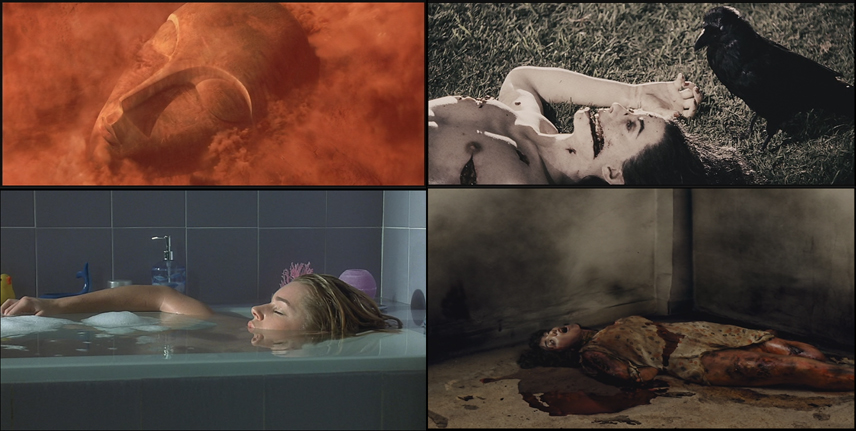
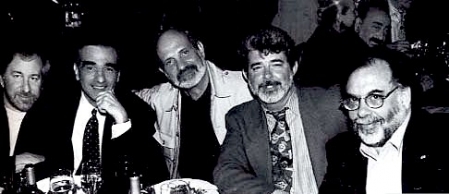
 Brian De Palma's Redacted was released today in Argentina under the title Samarra. One particularly insightful review of the film was posted by
Brian De Palma's Redacted was released today in Argentina under the title Samarra. One particularly insightful review of the film was posted by  Paul Greengrass's Iraq-themed Green Zone was released a couple of weeks ago to indifferent critical reception. Some felt the film tried to turn a non-fiction story into a Jason Bourne-type action/adventure and played too loosely with facts, while some appreciated Greengrass turning the subject of the Iwaq war and the search for mysterious WMDs into something audiences could ingest. Prior to the film's release, Greengrass himself discussed with
Paul Greengrass's Iraq-themed Green Zone was released a couple of weeks ago to indifferent critical reception. Some felt the film tried to turn a non-fiction story into a Jason Bourne-type action/adventure and played too loosely with facts, while some appreciated Greengrass turning the subject of the Iwaq war and the search for mysterious WMDs into something audiences could ingest. Prior to the film's release, Greengrass himself discussed with 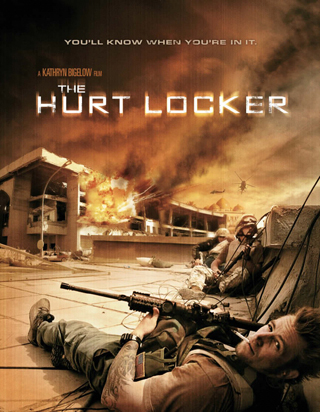 After months of avoiding any kind of political slant toward the war in Iraq whatsoever in discussing her film The Hurt Locker, Kathryn Bigelow told
After months of avoiding any kind of political slant toward the war in Iraq whatsoever in discussing her film The Hurt Locker, Kathryn Bigelow told 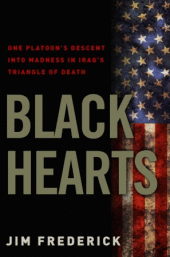 A new book out today by TIME magazine's Jim Frederick examines the real life story of the soldiers whose actions inspired the Brian De Palma film Redacted. Frederick's Black Hearts draws on interviews with soldiers from the unit known as "the Black Heart Brigade," with a critical eye toward the leadership, or lack thereof, involved in the soldiers' day-to-day activities. The book, subtitled "One Platoon's Descent Into Madness In Iraq's Triangle Of Death," does not mention De Palma's film. TIME magazine is running two excerpts this week:
A new book out today by TIME magazine's Jim Frederick examines the real life story of the soldiers whose actions inspired the Brian De Palma film Redacted. Frederick's Black Hearts draws on interviews with soldiers from the unit known as "the Black Heart Brigade," with a critical eye toward the leadership, or lack thereof, involved in the soldiers' day-to-day activities. The book, subtitled "One Platoon's Descent Into Madness In Iraq's Triangle Of Death," does not mention De Palma's film. TIME magazine is running two excerpts this week: 